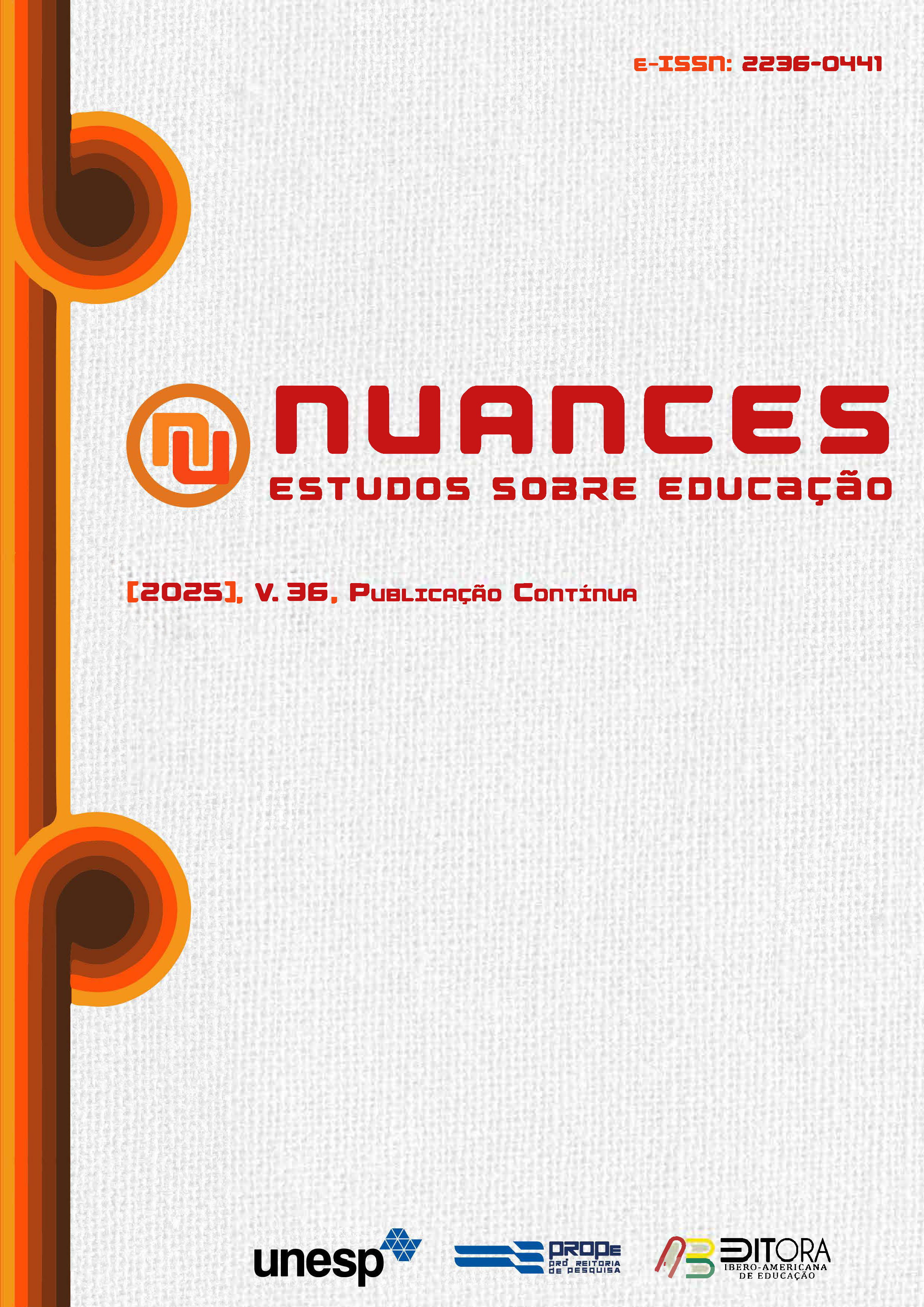Fundamentos filosóficos e problemas atuais da saturação dos conteúdos do curso de formação "estudos globais" nos estabelecimentos de ensino superior russos modernos
DOI:
https://doi.org/10.32930/nuances.v36i00.10899Palavras-chave:
Estudos Globais, Currículo Educacional, Multipolaridade, Cosmismo Russo, Filosofia da EducaçãoResumo
Este estudo examina os factores filosóficos, ideológicos e políticos que moldam a estabilidade global e o seu impacto na educação e nas relações internacionais. Utilizando uma abordagem multidisciplinar, contrasta o cosmismo russo com as ideologias liberais ocidentais, analisando pensadores-chave como N. F. Fedorov e P. A. Florensky. A investigação salienta a forma como os currículos de estudos globais reflectem uma mudança de quadros unipolares para multipolares, realçando o enriquecimento da educação através da identidade cultural e nacional. Estudos de casos, incluindo a participação da Rússia no "pivot para Leste" e na iniciativa "Uma Faixa, Uma Estrada", ilustram os impactos práticos da multipolaridade. Os resultados sugerem que a ênfase da Rússia nos valores tradicionais e na multipolaridade está a remodelar as relações globais, desafiando o domínio ocidental. A transição para uma ordem multipolar exige estratégias de colaboração e de inclusão baseadas na diversidade cultural.
Downloads
Referências
ARISTOTLE. Politika [Politics]. Moscow: AST, 2012. 393 p.
BOWDON, R. The analysis of ideology. Cambridge: Polity Press, 1989.
CHATFIELD, C.; ILYUKHINA, R. M. (eds.). Mir: Al'ternativy voyne ot antichnosti do kontsa Vtoroy Mirovoy Voyny [Peace: Alternatives to war from antiquity to the end of World War II. Anthology]. Moscow: Nauka, 1993.
DILTHEY, V. Vozzreniye na mir i issledovaniye cheloveka so vremen Vozrozhdeniya i Reformatsii [View of the world and the study of man since the Renaissance and Reformation]. 2. ed. Moscow: Center for Humanitarian Initiatives, 2013.
FEDOROV, N. F. "Zhit' so vsemi i dlya vsekh": Aforizmy i fragmenty ["To live with all and for all": Aphorisms and fragments]. Moscow: Akademicheskiy proekt, 2019.
FEDOROV, N. F. Sobraniye sochineniy: v 4-kh tomakh [Essays in 4 vols.]. Moscow: Progress, 1995. v. 1.
FLORENSKY, P. A. Sochineniya v 4 t. [Works in 4 vols.]. Moscow: Mysl, 1996. v. 2.
GUZEEVA, O. Rights and obligations of the state as a participant of criminal law relations. Legal Bulletin, v. 4, n. 8, p. 76–93, 2023. DOI: 10.5281/zenodo.11190367.
KAGAN, R. O raye i sile: Amerika i Yevropa v novom mirovom poryadke [About paradise and power: America and Europe in the new world order]. Moscow: ROSSPAN, 2004.
KAGAN, R. The jungle grows back: America and our imperiled world. New York: Alfred A. Knopf, 2018.
KAGAN, R. The world America made. New York: Alfred A. Knopf, 2012.
NASH, M. Cauldron ethnicity in the modern world. Chicago: University of Chicago Press, 1989.
PETROVSKY, V. F. Doktrina "natsional'noy bezopasnosti" v global'noy strategii SSHA [The doctrine of "national security" in the US global strategy]. Moscow: International Relations, 2012.
PLATO. Zakony [Laws]. In: Sochineniya [Works]. Moscow: Mysl, 1972. v. 3, pt. 2.
POLOVCHENKO, K. A. Constitutional foundations of the security system in a modern state. International Journal of Electronic Security and Digital Forensics, v. 13, n. 4, p. 390-402, 2021.
SHARIPOV, А. М. Gosudarstvennoye obespecheniye preyemstvennosti sotsiokul'turnogo razvitiya natsii [State provision of continuity of socio-cultural development of the nation]. In: RASTORGUEV, V. N. (ed.). Traditsionalizm v epokhu revolyutsiy: Kul'turnaya politika i tsivilizatsionnyy vybor: Kollektivnaya monografiya po materialam XIV Mezhdunarodnykh Panarinskikh chteniy [Traditionalism in the era of revolutions: Cultural policy and civilizational choice: A collective monograph based on the materials of the XIV International Panarin readings]. Moscow: Russian Research Institute of Cultural and Natural Heritage named after D.S. Likhachev, 2017.
THOMAS AQUINAS. Vopros 40. O voyne [Question 40. About the war]. In: Summa teologii [The sum of theology]. Kiev: Nika-center, 2011. pt. 2-2.
UNITED STATES. President (1817-1825: Monroe). The Monroe Doctrine: Also, Jefferson’s letter to Monroe. Santa Barbara: University of California, 1920.
VOLKOVA, P. S. Iskusstvo v aspekte dialoga. K voprosu o filosofii obrazovaniya [Art in the aspect of dialog. On the question of educational philosophy]. Art Criticism, n. 1, p. 6-14, 2023.
YESPOLOVA, G.; YBYRAIMZHANOV, K.; MUSSABEKOVA, G. Research competence of pupils as the component of content of education. Opcion, v. 35, n. 88, p. 948-961, 2019.
ZHUKOTSKAYA, A. V. Problema ideologii: Sotsial'no-filosofskiy analiz [The problem of ideology: Socio-philosophical analysis]. Dissertation (Doctor of Philosophy) - Moscow State University, Moscow, 1998.
Downloads
Publicado
Como Citar
Edição
Seção
Licença
Copyright (c) 2025 Nuances: Estudos sobre Educação

Este trabalho está licenciado sob uma licença Creative Commons Attribution-NonCommercial 4.0 International License.
Atribuição-NãoComercial
CC BY-NC
Esta licença permite que outros remixem, adaptem e criem a partir do seu trabalho para fins não comerciais, e embora os novos trabalhos tenham de lhe atribuir o devido crédito e não possam ser usados para fins comerciais, os usuários não têm de licenciar esses trabalhos derivados sob os mesmos termos.





